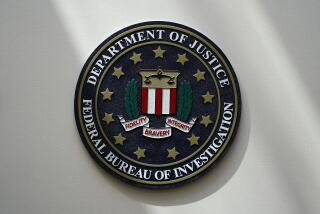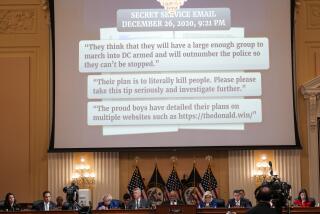Witness Says U.S. Embassy in Riyadh Was on Bomb List
- Share via
NEW YORK — A former member of Islamic militant Osama bin Laden’s terrorist organization said Tuesday that the group considered bombing the U.S. Embassy in Riyadh, the capital of Saudi Arabia, in 1994.
Under cross-examination by defense lawyers, Jamal Ahmed Al-Fadl testified that Egyptian extremists in the group called al-Qaeda, which means the Base, proposed blowing up the embassy, but the plan was rejected after Saudi members of the group protested.
Al-Fadl testified last week that two years later Al-Fadl walked into a U.S. embassy in an unidentified country and shared this information--and eventually much more--with the FBI and other intelligence agencies.
It was the start of a journey that brought the carefully spoken Sudanese to a heavily guarded New York courtroom as a prime government witness in the trial of four Bin Laden followers, charged in the 1998 bombings of U.S. embassies in Kenya and Tanzania that killed 224 people.
Al-Fadl, who is in the federal witness protection program, told the jury that the U.S. government so far has spent more than $945,000 guarding and caring for him--a clear measure of the importance it places on his seeming encyclopedic knowledge.
“Would you prefer to consider yourself an informant, a snitch, a turncoat? Which term do you use?” asked David P. Baugh, whose client Mohamed Rashed Daoud al-’Owhali faces the death penalty if convicted.
“Informant,” Al-Fadl replied without missing a beat.
Al-Fadl’s testimony has provided the most public picture so far available of the history, structure and motivation of Bin Laden and his group.
Seeking to discredit the witness, Baugh asked if he would have been willing to set off bombs, kill innocent people and even die for al-Qaeda.
Each time, Al-Fadl replied, “Yes.”
“If a Muslim commits a sin, can that prevent him from going to paradise?” the lawyer asked.
“Sins can differ,” Al-Fadl said.
He said that when Bin Laden’s organization left Afghanistan after Soviet troops withdrew, al-Qaeda settled in Sudan and the Sudanese government provided a “couple of hundred passports” for the terrorists to use on missions.
Defense lawyers sought to picture Al-Fadl as a cynical turncoat terrorist who struck a deal with prosecutors.
Al-Fadl said that, under the terms of his agreement, 15 years in prison would be the maximum sentence he would receive after pleading guilty to charges of terrorist conspiracy and weapon transportation.
“You’re hoping you’d get less,” said David Stern, the lawyer for Khalfan Khamis Mohamed, who also faces the death penalty.
“You might not go to jail at all,” Stern said.
“Do you expect to be alive at the end of it?” the lawyer asked, seeking to stress to the jury the difference between his client’s possible sentence and what Al-Fadl faces.
“It’s in God’s hands,” Al-Fadl said.
Two other defendants, Wadith El-Hage and Mohamed Sadeek Odeh, could receive life in prison without parole if found guilty in the embassy bombings.
Bin Laden also was indicted in the twin attacks that injured more than 4,500 people. Among the dead were 12 Americans.
Bin Laden is believed to have returned to Afghanistan. The U.S. government has offered a $5-million reward for his capture.
More to Read
Sign up for Essential California
The most important California stories and recommendations in your inbox every morning.
You may occasionally receive promotional content from the Los Angeles Times.













